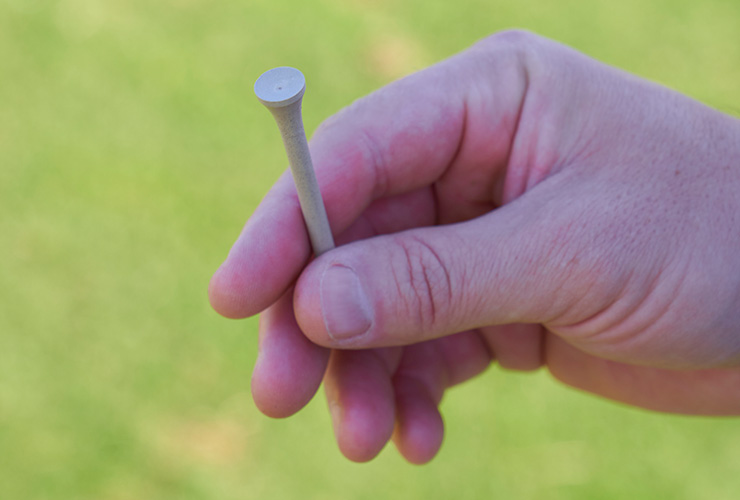Image supplied
We have all enjoyed a good walk on the golf course — taking in the fresh air and enjoying a little connection with Mother Nature — but in this climate-conscious age, with every tee shot, we have unknowingly been contributing to an environmental issue.
Golf tees: Those 2¾-inch pegs that are the first thing you reach for in your bag or from the complimentary bowl on the first tee still come at a price to the clubs and the environment.
The numbers can be staggering as 400,000 tees are used on average on each golf course in the Emirates each year, adding up to 8.8 million over 22 courses. And they all need to be disposed of.
While we are aware of the impact plastic tees create, their wooden replacements still take a toll on nature, as they take up to three years to begin to degrade, not to mention the damage to the agronomy teams’ machinery, mowers and blades, which in turn can damage the manicured tee boxes, fairways and greens.
In all, this results in 17 tons of waste tees taken to landfills each year, plus the felling of 220 trees annually to keep up with demand, with overseas transportation and costs all adding to the carbon footprint of each wooden tee you use.

Image supplied
Now a UAE-based company has come up with an eco-friendly solution.
Established in 2022, the guys at Palm Tees are ready to make a big difference. Made in partnership with Palmade — the team behind the biodegradable cutlery for Expo 2020 —Palm Tees are 100 per cent biodegradable tees, which are made from palm waste and plant-based polymers, helping offset the damage to trees and landfill issues, and also combating the environmental issue of an estimated annual 500,000 tons of palm waste across the UAE itself, which is sent to landfills or burned — again coming with a pollution price tag. Each golf course on average accounts for up to 500kg of palm waste per year, which can be collected and used to produce the Palm Tees.
With this being the UAE Year of Sustainability, if one course in the UAE adopted the use of Palm Tees rather than traditional wooden tees, it would offset more than 220kg of palm waste, avoid the felling of more than 20 trees overseas, while also utilising natural products that will degrade back to nature in their component parts.

Palm Tees are 100 per cent compostable and are manufactured in the UAE using a meticulous process to ensure they are up to scratch performance-wise.
Unlike wooden tees, which splinter and litter the tee boxes, Palm Tees don’t splinter and, if left on the course, biodegrade naturally, helping to contribute to a more circular economy
With Palmade on board, this tried-and-tested formula is a recipe for success.
For more information, you can contact the team at Palm Tees on [email protected] and they can also be purchased on palmtees.ae, amazon.ae and BD Golf Dubai.









